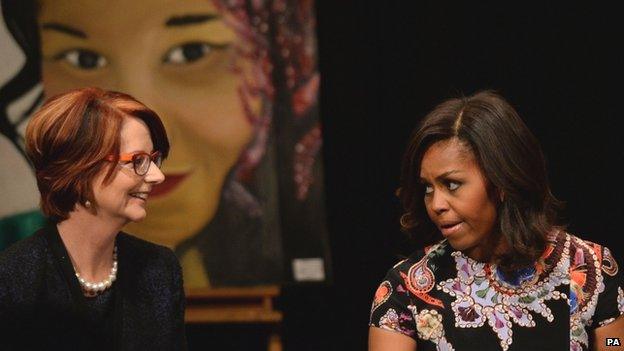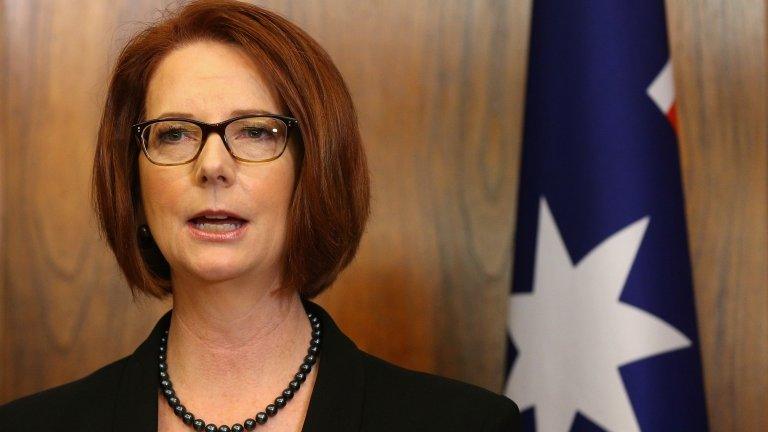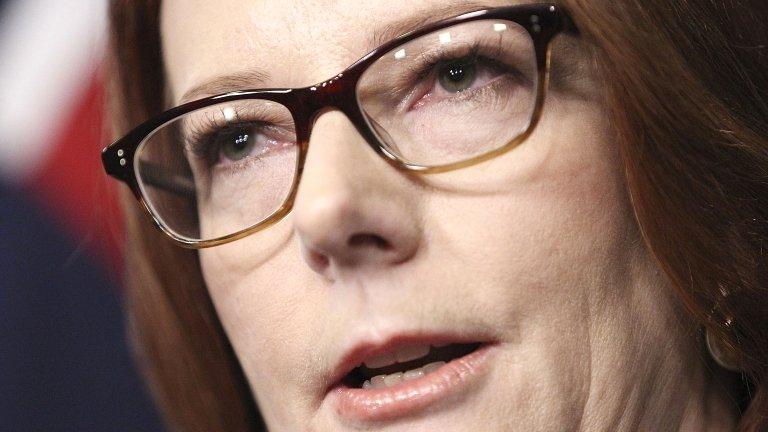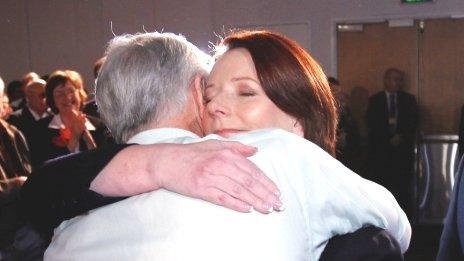Julia Gillard: Welsh roots key to ex-Australian PM's politics
- Published
Ms Gillard said her Welsh roots had remained with her throughout her life
Welsh roots shaped Julia Gillard's politics which led her to become Australia's first female prime minister, she has told BBC Wales.
Born in Barry, she and her family emigrated when she was four, but stories about her late father's early life in the Neath Valley stayed with her "in politics and beyond".
Ms Gillard, 53, was the Australian Labor Party prime minister in 2010-13.
She has been speaking on BBC Radio Wales programme, Sunday Supplement.
Ms Gillard said she did not have "original memories" of Wales but the fact her parents' "formative experiences were there, that was the subject of our family discussions in the home, so the consciousness that I was born in Wales and that mattered, has been with me throughout my life".
Speaking to presenter Vaughan Roderick, BBC Wales' Welsh affairs editor, she explained how her father, who had lived in Cwmgwrach, was "very interested in politics and he thought for both my sister and I that it was important we grew up with an understanding of government and policies and why they mattered and what fairness was".
Ms Gillard left for Australia with her family at the age of four
She added: "In giving us that world view, all of the examples were from south Wales; from him growing up in a coal mining village in Cwmgwrach, being one of seven children, not being able to complete his education simply because of the poverty of his family."
She explained how he won a scholarship to finish secondary school education but ended up leaving school at 14.
"And so all of these things about fairness and equity, the importance of education, were burnt into my sister and I from very early on in our family life and they have been the values which have stayed with me," she said.
She said she had been shocked to see the contrast between Cwmgwrach and her own childhood home in Australia when she visited.
"I remember, vaguely, my first memories of being in the migrant hostel when we arrived in Australia, but then all of my other childhood memories were of being in our home in Kingswood, a suburb of Adelaide, going to the local state school... we had a house with a big back yard. I mean, we weren't moneyed people but that was the Australian way of life.
Ms Gillard said her affirmative action target had encouraged more women into politics
"And then to go to Cwmgwrach to see the sort of housing people lived in... my grandmother, my father's mother, was still alive then and she lived in a house with an outside toilet and things like that.
"But also, to be surrounded by people you were related to, this was a completely different experience for me.
"For all of my life my family had been mum, dad and my sister, Alison, and we weren't related to anyone else in Australia and there you were suddenly in a village in south Wales where you are just related to so many people, so many cousins and aunts and uncles."
Ms Gillard served as the 27th prime minister of Australia, and the Australian Labor Party leader for three years and three days from 2010 to 2013. She was the first woman to hold either position.
On 26 June 2013, after a leadership split, Ms Gillard lost the leadership of the party to Kevin Rudd. She resigned as prime minister the following day.

Julia Gillard (left) and US First Lady Michelle Obama were at a girls' school in east London on Tuesday to say education is key to success
- Published27 June 2013

- Published18 July 2013

- Published19 September 2012
